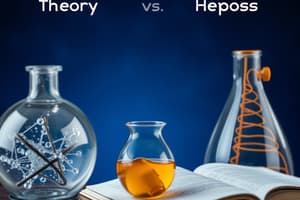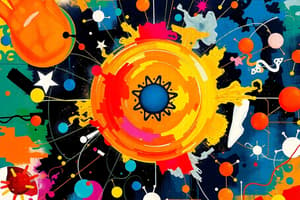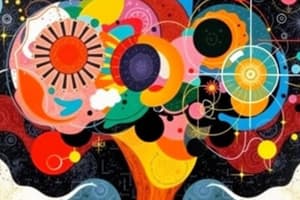Podcast
Questions and Answers
What is the primary difference between a scientific theory and a law?
What is the primary difference between a scientific theory and a law?
- A theory is used to make predictions, while a law is used to explain phenomena
- A theory is widely accepted, while a law is not
- A theory explains why something happens, while a law describes what happens (correct)
- A theory is a guess, while a law is a proven fact
What is required for a hypothesis to become a scientific theory?
What is required for a hypothesis to become a scientific theory?
- It must be widely accepted by the general public
- It must be proposed by a famous scientist
- It must be tested over and over again and supported by a great deal of evidence (correct)
- It must be tested once and supported by a little evidence
What is the difference between the way 'theory' is used in science and in everyday life?
What is the difference between the way 'theory' is used in science and in everyday life?
- In science, a theory is a well-supported explanation, while in everyday life, it is a guess or hunch (correct)
- In science, a theory is a hypothesis, while in everyday life, it is a fact
- In science, a theory is a guess, while in everyday life, it is a proven fact
- In science, a theory is a law, while in everyday life, it is a hypothesis
What is the process by which evolution occurs?
What is the process by which evolution occurs?
What is a characteristic of a scientific theory?
What is a characteristic of a scientific theory?
What is an example of a well-known theory in biology?
What is an example of a well-known theory in biology?
What is the main idea behind the theory of evolution by natural selection?
What is the main idea behind the theory of evolution by natural selection?
What is a common characteristic among the three scientific theories mentioned?
What is a common characteristic among the three scientific theories mentioned?
What is the main idea behind the germ theory of disease?
What is the main idea behind the germ theory of disease?
What do the cell theory and the theory of evolution by natural selection have in common?
What do the cell theory and the theory of evolution by natural selection have in common?
What is the cell theory primarily concerned with?
What is the cell theory primarily concerned with?
What can be inferred about these scientific theories?
What can be inferred about these scientific theories?
Flashcards are hidden until you start studying
Study Notes
Scientific Theories
- A scientific theory is a broad explanation for events that is widely accepted as true, supported by a great deal of evidence from repeated testing.
- A hypothesis must be tested over and over again to become a theory.
- A theory explains why something happens, whereas a law only describes what happens.
The Theory of Evolution
- The theory of evolution by natural selection explains how living things are changing today and how modern living things have descended from ancient life forms.
- Evolution is a change in the characteristics of living things within a species over time through natural selection.
- Natural selection occurs when some living things produce more offspring than others, passing more genes to the next generation.
- The theory is well-supported, and no evidence has been identified that proves it is incorrect.
The Cell Theory
- The cell theory states that the cell is the smallest unit of structure and function of all living organisms.
- All living organisms are made up of at least one cell.
- Living cells always come from other living cells.
- No evidence has been identified that proves this theory is incorrect.
The Germ Theory
- The germ theory of disease proposes that microorganisms are the cause of many diseases.
- A vast amount of evidence supports this theory, and no evidence has been identified that proves it is incorrect.
Studying That Suits You
Use AI to generate personalized quizzes and flashcards to suit your learning preferences.




